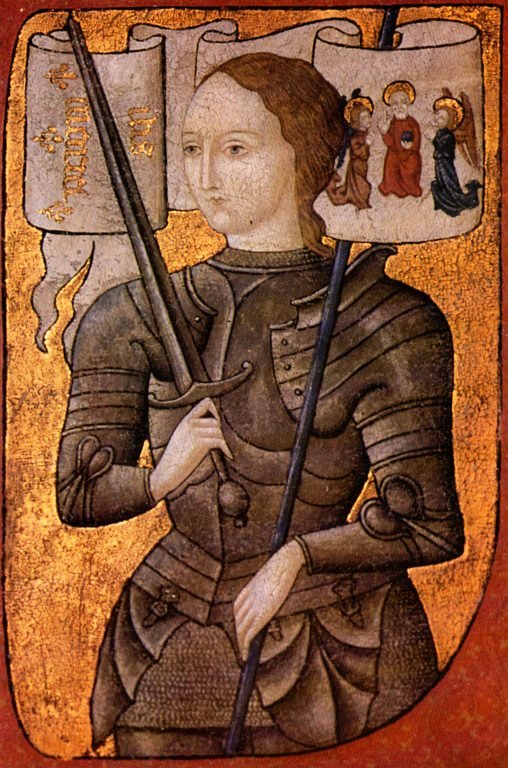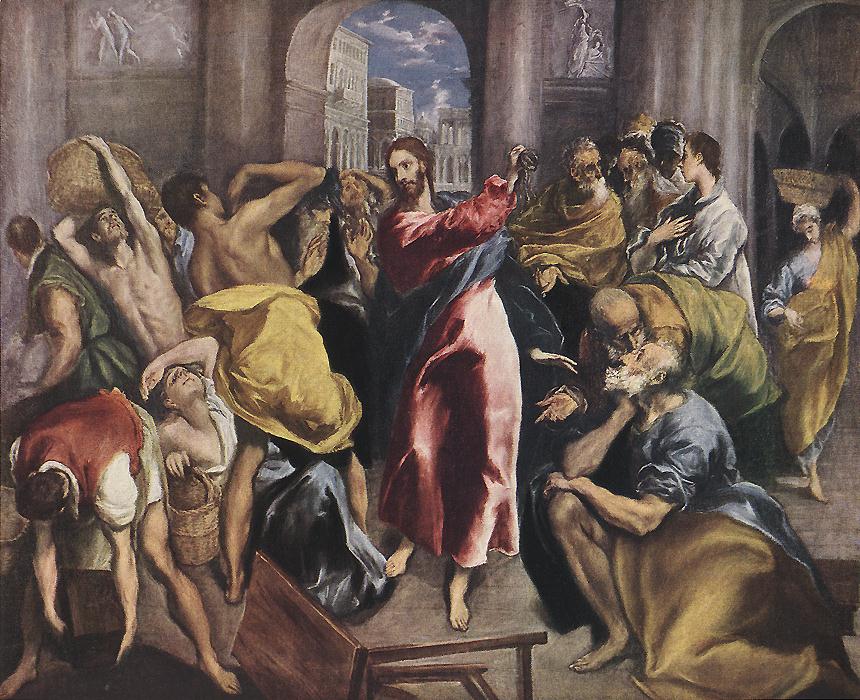At the beginning I said there were Personalities in God. I will go further now. There are no real personalities anywhere else. Until you have given up your self to Him you will not have a real self. Sameness is to be found most among the most “natural” men, not among those who surrender to Christ. How monotonously alike all the great tyrants and conquerors have been; how gloriously different are the saints.
– C.S. Lewis, Mere Christianity
In seminary, I heard a great deal about Jesus’ nonviolence. If we adopted it, it was felt, we’d live in a bed of tolerant sunshine and roses, and everyone would live happily ever after. Or maybe it was more “this is the ideal, and it doesn’t matter about the consequences of said actions; only that we obey Jesus’ command.” Apparently, Jesus created a whip and laying the smack down on merchants in the temple at Jerusalem just isn’t considered violent. Here’s the John 2 version:
13 The Passover of the Jews was near, and Jesus went up to Jerusalem. 14 And He found in the temple those who were selling oxen and sheep and doves, and the money changers seated at their tables. 15 And He made a scourge of cords, and drove them all out of the temple, with the sheep and the oxen; and He poured out the coins of the money changers and overturned their tables; 16 and to those who were selling the doves He said, “Take these things away; stop making My Father’s house a place of business.” 17 His disciples remembered that it was written, “Zeal for Your house will consume me.”
So, think about this for a second: for narrative purposes, John just tells us “He made a scourge of cords” – probably not a cat of nine tails, but definitely an implement to do some damage. So the questions remains: where did Jesus pick up this skill? How long did it take him to make a multi-pronged whip device? Was it relatively easy or relatively hard to make such a thing? Did people do this all the time? I’m going to say “no” to that one. Or maybe he just whipped the animals; that would work in a pacifist paradigm except for the Synoptics say He drove the money-changer out, but it doesn’t say He made a whip. Wow, is this getting confusing.
Perhaps Jesus going hardcore remains the reason why I’m not a pacifist. Some thing, to me, demand conflict and fighting, physical or mental. Christianity appears as one of those things for which people should fight. Though, you kinda have to ask yourself, how many times in history has pacifism become an option for a majority?
I’m not talking about the early Christians; they were a persecuted minority for the most part, and it’s perfectly fine when they become martyrs or die for something in which they believe. But, when Christianity becomes the dominant religion of an entire Empire, the one to which you must convert, does pacifism remain an option for that Empire? Do you pick and choose which lives should suddenly end, or which lives remain? Should the Empire crumble due to Jesus’ message of nonviolence and leave an entire civilization of Christians at risk to death, pillage, and rape?
That, to me, seems the dilemma of the Roman Empire during the latter years of its reign. Should we judge them and demand that they die rather than live? Should we tell the Christians of the past “Fighting isn’t the way of Christ; you weren’t true Christians”? I can’t imagine anyone saying such a thing; yet they can, and they do. Repeatedly. Without end, as if somehow judging the past will magically change all of our opinions. Jesus and the Quakers are identical, apparently. But that can’t possibly be the case!
We find that we idolize both the warrior and the martyr equally. Joan of Arc gets as much play as many of the earliest martyrs, if not more, yet she led an army and brought much death into the world. The warrior who fights and dies, and the martyr who dies willingly, both live forever in the heart and mind. Leave it to Chesterton to make sense of a paradox:
So it is also, of course, with the contradictory charges of the anti-Christians about submission and slaughter. It IS true that the Church told some men to fight and others not to fight; and it IS true that those who fought were like thunderbolts and those who did not fight were like statues. All this simply means that the Church preferred to use its Supermen (warriors) and to use its Tolstoyans (pacifists). There must be SOME good in the life of battle, for so many good men have enjoyed being soldiers. There must be SOME good in the idea of non-resistance, for so many good men seem to enjoy being Quakers. All that the Church did (so far as that goes) was to prevent either of these good things from ousting the other. They existed side by side. The Tolstoyans, having all the scruples of monks, simply became monks. The Quakers became a club instead of becoming a sect. Monks said all that Tolstoy says; they poured out lucid lamentations about the cruelty of battles and the vanity of revenge. But the Tolstoyans are not quite right enough to run the whole world; and in the ages of faith they were not allowed to run it. The world did not lose the last charge of Sir James Douglas or the banner of Joan the Maid. And sometimes this pure gentleness and this pure fierceness met and justified their juncture; the paradox of all the prophets was fulfilled, and, in the soul of St. Louis, the lion lay down with the lamb. But remember that this text is too lightly interpreted. It is constantly assured, especially in our Tolstoyan tendencies, that when the lion lies down with the lamb the lion becomes lamb-like. But that is brutal annexation and imperialism on the part of the lamb. That is simply the lamb absorbing the lion instead of the lion eating the lamb. The real problem is—Can the lion lie down with the lamb and still retain his royal ferocity? THAT is the problem the Church attempted; THAT is the miracle she achieved.
Like many things in Christianity, paradox becomes the question and the answer all at once. We must accept diversity within our ranks, for it is Christ that gives us personality. We all think differently. Some of us fight, and some of us submit, but that does not make us any more or any less Christian. To do anything else denies the uniqueness of that person and forces them into your mold. If Christianity and the Church remain anything at all, they are not weapons and tools of domination used against others. To deny this denies the weird eccentricities of life – a big ol’ mess of people. Like a family, in other words. You don’t have to like your fellow just war theorist/pacifist/man in open favor of brutal conflict; but you do have to love them.


